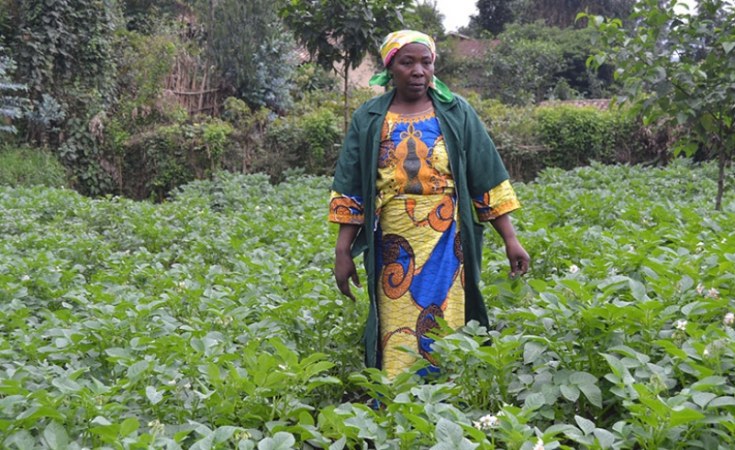A project run by UN agencies is assisting women as they grow crops and business
Hoe in hand, Godelive Niyonagira heads to her fields in the quiet hills of Muyinza village, some 130 km south of Rwanda's capital Kigali. The warm sun chases away a chilly wind that sweeps through the high slopes.
Niyonagira has a maize crop to manage, which fits into her bigger plan: to renovate her home and secure medical insurance. She can do both with the profits from her harvest, which have surged, thanks to a World Food Programme (WFP) initiative allowing women farmers to access loans at affordable terms.
"I work hard to ensure my family has food," she says, "and sell the surplus to meet my non-food needs." Niyonagira is a single mother of five children.
Known as SheCan, the WFP initiative reaches more than 1,200 smallholder farmers in Rwanda - one of the most densely populated countries in Africa with more than 38 percent of its population (13.2 million people) living below the poverty line.
SheCan...
· taps into crowdfunding and public donor contributions to help them grow their businesses. Women growers account for the majority of participants reaping the benefits
· is part of a raft of initiatives targeting rural women that WFP is supporting in Rwanda along with three other UN agencies: the Food and Agricultural Organization (FAO), the International Fund for Agricultural Development (IFAD) and UN Women
· aims to give rural women the tools to become business leaders and agents of change in their communities. That, in turn, helps to reduce gender inequality and poverty, and to improve food security.
While women play a powerful role in Rwanda's politics - making up 61 percent of the country's parliament - others face many challenges getting ahead in their walks of life.
That is especially true for women farmers like Niyonagira, who collectively form the backbone of the country's agricultural sector, contributing to 79 percent of the workforce and nearly a third of the country's economy. Yet their journey is fraught with obstacles before even plowing a field or sowing a seed.
Only 34 percent of women over 18 years have bank accounts, compared to 38 percent of men. Female-headed families tend to be poorer than male-headed ones.
Women farmers are also more likely to have lower education levels and practice subsistence farming than their male counterparts. Additionally, most juggle unpaid household work, like cooking, cleaning and raising their children, amounting to less time in the field. And they have less access to tools that can get them ahead, including land, financing, farming services and markets.
"Through these empowerment initiatives, we aim not only to help address economic disparities, and ensure access to balanced diets, but also to dismantle systemic barriers hindering women from reaching their full potential," says Andrea Bagnoli, WFP Representative and Country Director in Rwanda.
Through WFP's innovative financing initiative, maize farmers such as Niyonagira have been able to access affordable credit from various financial institutions as members of a women-dominated cooperative called COAMAGI ("cooperative of Maize growers in Gisagara district"). WFP worked with microfinance institutions to lend capital at preferential rates, reducing fees and easing loan requirements.
The money allowed Niyonagira to expand her farming activities, resulting in a stunning 30 percent increase in her maize harvest. She says: "I'm very happy my life has been changed, I'm so hopeful to get out of poverty."
Blandine Mukakarisa belongs to the same cooperative as Niyonagira. "My maize harvest doubled," she says.
WFP and its partners are also reaching women farmers elsewhere in the country. In eastern Rwanda, a WFP programme has installed solar-powered irrigation systems benefiting 2,000 farmers in 19 women's cooperatives.
Growers like Goretti Uwitije, from Ngoma district, who previously relied on often scarce rains, saw their harvests flourish and profits jump tenfold as a result. "I'm happy because I'm witnessing a transformation," says Uwitije. "I was once dependent on the unpredictable mercy of scarce rains to sustain my crops. With the solar-powered irrigation system, I have a thriving harvest, due to WFP support."
WFP's efforts to empower rural women extend beyond economic empowerment, aiming to reduce gender inequalities and poverty while enhancing food security at the community and household level.
In the words of WFP Country Director Bagnoli, "empowering women in agriculture doesn't just boost their economic well-being, but has ripple effects on their communities."


